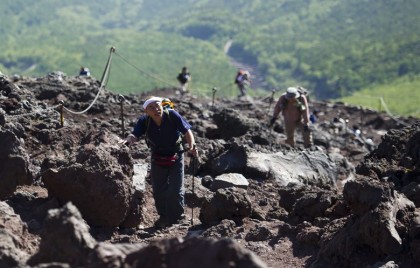Human Effort: What’s It For?
Devra Torres | Jun 30, 2018
It's taken a long, long time for me to believe that we are saved not by works but by grace. We don't have it in us to "earn" salvation, even if we were to make a sustained and conscientious lifelong effort. (And I don't know about you, but I sure can't say I've done that.) It's ALL grace. "Without Me you can do nothing" means exactly what it sounds like it means.
Well, then, what IS the role of human effort?
When I was a Protestant kid of the once-saved-always-saved persuasion, I was taught that human effort was just an expression of love for God, with no eternal ramifications. (Actually the Christians we knew were, like Dorcas, "full of good works," but their theology didn't require it.) As I recalled in a post exploring what exactly eternal security implied,
I once asked my Sunday school teacher:
So, if I'm saved no matter what I do, does that mean I can commit all the sins I want from now on?
There was a pause, and then she replied:
Well, if you were really saved, you wouldn't want to.
But even she didn't sound convinced.
According to the doctrine of eternal security, human effort counts for nothing.
The other extreme would be pelagianism. The pelagian imagines he has it in him to earn salvation, to do good and avoid evil unaided by God.
According to the pelagian, human effort counts for everything.
A Christian personalist, focused on the reality and centrality of what goes on inside the person, wouldn't want to subscribe to either extreme. But then how does it all fit together?
I think I just found the answer--or at least a uniquely lucid expression of how faith, and grace, and works, and abandonment, and human effort all come together in each person's salvation history. It's in Gaudete et exsultate, Pope Francis' recent (and very uncontroversial!) apostolic exhortation. Here's what he says in section 56:
Only on the basis of God’s gift, freely accepted and humbly received, can we cooperate by our own efforts in our progressive transformation.
That is, we are on our way through a "progressive transformation." But acceptance of a gift we never earned is what opens the way.
We must first belong to God, offering ourselves to him who was there first, and entrusting to him our abilities, our efforts, our struggle against evil and our creativity, so that his free gift may grow and develop within us:
So the project--the adventure--of personal life--the "development" and "unfolding" that we personalists like to talk about so much--is still before us. There's a place for those "abilities," "efforts," "struggle" and "creativity"--a far cry from the passive resignation and renunciation of imagination, ingenuity and adventurousness that make up the caricature of the Christian. Pope Francis calls in St. Paul:
“I appeal to you, therefore, brethren, by the mercies of God, to present your bodies as a living sacrifice, holy and acceptable to God” (Rom 12:1). For that matter, the Church has always taught that charity alone makes growth in the life of grace possible, for “if I do not have love, I am nothing” (1 Cor. 13:2).
This line always reminds me of a hilarious and insightful saying we used to have at the Community Bible Chapel: "The problem with a living sacrifice is, it keeps trying to crawl off the altar."
Human persons, subject to the vagaries of time and shifting physiological states, might try to make of themselves a holocaust--the kind of offering that is utterly destroyed and consumed, once and for all. But as the consuming fire gets closer, we're besieged by second thoughts, sidetracked by the pursuit of loopholes, not so sure after all that we want to go through with it. We doubt, reasonably enough, that we have it in us. We doubt, less reasonably, that God will be there to supplement the "nothing" that we can do without Him.
But if we can get past the false either-or--either unearned gift or freely chosen effort--we can get on with the inner transformation and the eternal happiness.

